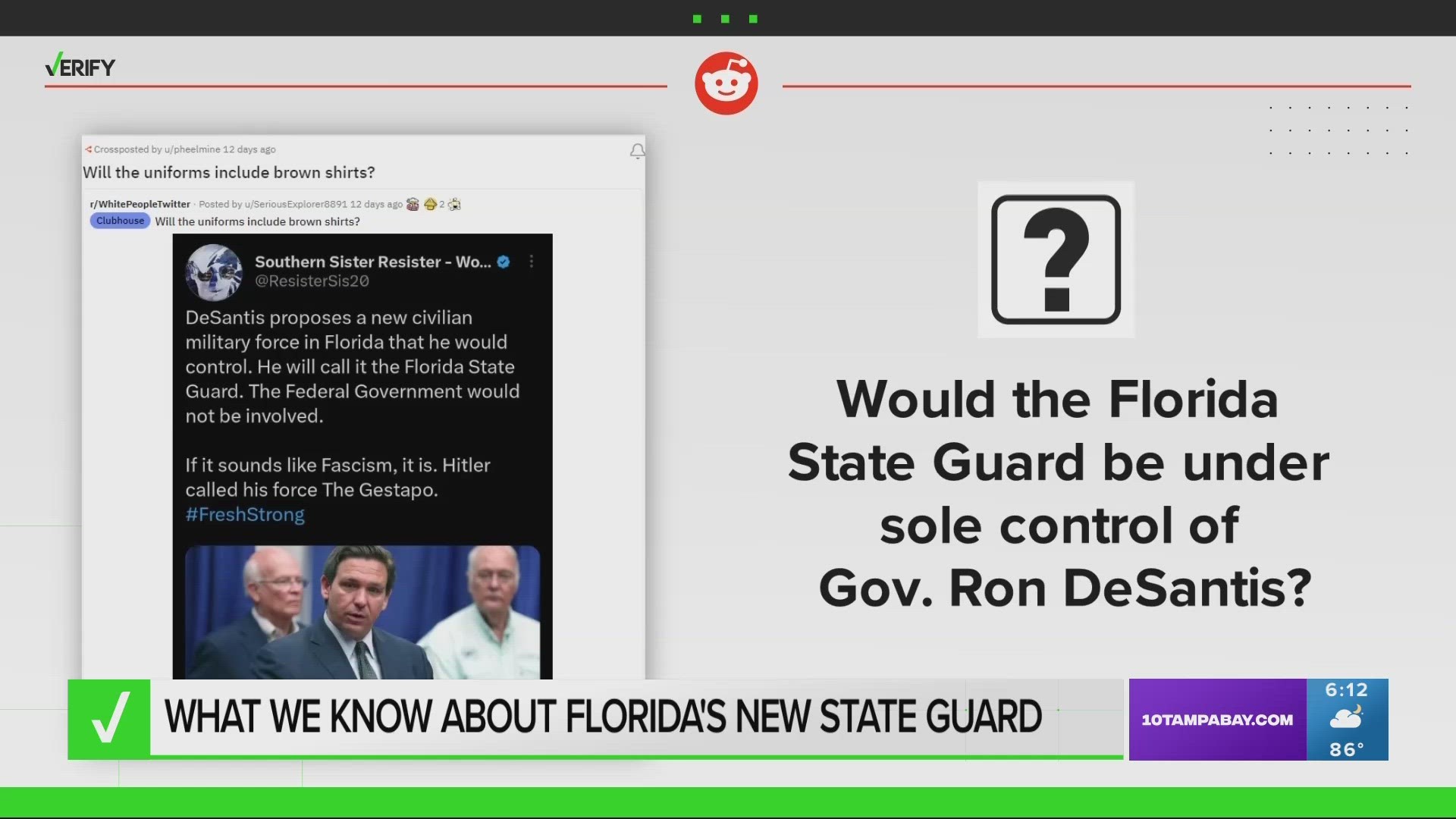TALLAHASSEE, Fla. — Florida lawmakers have finalized a $107 million budget to fund the state’s revived military force.
The proposal was signed into law by Gov. Ron DeSantis on May 26.
DeSantis first announced he’d be reestablishing the Florida State Guard in December 2021.
Critics have characterized it as a “vigilante militia” and “secret police” solely under DeSantis’ command.
A VERIFY viewer asked what the chain of command would look like.
THE QUESTION
Would the Florida State Guard fall solely under the control of DeSantis?
THE SOURCES
- Florida Bill 1285 PDF
- Florida House Appropriations Committee
- State Archives of Florida
- U.S. Code
- Joseph Nunn, Brennan Center for Justice
THE ANSWER
Yes, under state law the Florida State Guard would be under the control of the governor. But whether that power is immune to all federal intervention needs context.
WHAT WE FOUND
Florida's State Guard dates back to World War II. It was initially known as the Florida Defense Force, created to replace Florida National Guard members who were deployed at the time.
The force was active until 1947.


State lawmakers authorized $10 million to reactive the force in 2022 at the request of DeSantis whose initial announcement called for 400 members.
State forces like this are authorized by Congress under 32 U.S.C. § 109, according to Joseph Nunn with the Brennan Center, whose expertise is in military powers and constitutional law.
Nearly two dozen other states – including New York and California – have active state forces.
Nunn says state defense forces historically are small and specialized because they're solely funded by the state.
But following his initial announcement, DeSantis is now looking to triple the size of the Florida State Guard to 1,500 members. He's asking for more than $107 million to purchase equipment, vehicles and storage facilities. Nearly $50 million would be used for one "large" airplane and four helicopters.
DeSantis, in his initial pitch, said a state guard was necessary to supplement Florida’s overworked National Guard, especially after natural disasters like hurricanes.
But in addition to being activated when the Florida National Guard is activated, under HB 1285, the unit would be given a broad mandate to “protect and defend the people of Florida from threats to public safety.” It could be called up “to preserve the public peace, execute the laws of the state, enhance domestic security, respond to terrorist threats or attacks.”
Some members of a specialized unit would be authorized to arrest people.
The unit would be able to supplement virtually any state agency from the Florida Fish and Wildlife Commission (FWC) to the Florida Department of Law Enforcement (FDLE) or even the governor’s controversial election police force, Rep. Mike Giallombardo, R-Cape Coral, said in a House Appropriations Committee meeting back in March.
“Why not just increase FLDE personnel and funding?” Rep. Fentrice Driskell, D-Tampa, questioned Giallombardo during the meeting.
Giallombardo argues it makes better financial sense for the state.
“This is a way that we can be a volunteer that would be willing to lend their talents, their knowledge, skills and abilities to the State of Florida,” he said. “Without having to be full-time, without having the commitment of getting a salary from the state.”
Giallombardo said the state is vetting more than 3,600 applications right now.
Training for Florida State Guard members must be equivalent to the training requirements for members of the Florida National Guard.
Florida’s State Guard will be headed up by a director appointed by DeSantis, subject to Senate approval.
In June, DeSantis named Retired Marine Corps Lt. Col. Chris Graham to the position. But ultimately, it's the governor who will have “final command and control … at all times,” according to the bill.
Unlike Florida’s National Guard, which the governor or president has the power to activate, the president cannot call upon a state guard.
But Nunn says that doesn’t necessarily mean the Florida State Guard would be free of any potential federal oversight or intervention.
“The federal law that authorizes state defense forces bars them from being federalized in the same way as the National Guard,” Nunn explained. “But it's important to understand that is purely a choice that Congress has made and Congress could amend that law at any time."
The U.S. Supreme Court previously suggested this possibility, Nunn said, when it noted in the 1990 case Perpich v. Department of Defense that “the immunity of those forces from impressment into the national service appears — if indeed they have any such immunity — to be the consequence of a purely statutory choice.”
In that case, Nunn adds, the Court also acknowledged the Insurrection Act could potentially allow the president to take control of a state force.

